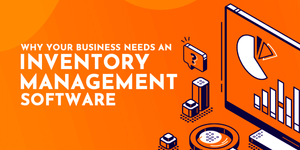Enhance Your Business Efficiency with the Best Inventory Management System

An effective inventory management system is crucial for the success of any business, particularly in the fast-paced world of ecommerce. Managing stock levels, tracking product movements, and ensuring you have the right products at the right time are essential tasks that can become overwhelming without the right tools. That’s why selecting the best inventory management software can make a significant difference in streamlining your operations.
In this article, we’ll explore the best solutions for inventory management, including the integration with CRM and ERP systems.
What is an Inventory Management System?
An inventory management system is a software solution designed to track, manage, and control inventory from production to the point of sale. Whether you’re running a small retail shop or a large ecommerce platform, efficient inventory management ensures that you can meet customer demands without overstocking or understocking products.
Key functionalities of an inventory management system include:
- Real-time tracking of stock levels.
- Automatic reordering of low-stock items.
- Integration with POS inventory systems.
- Compatibility with CRM and inventory management tools.
By maintaining real-time data, an inventory system allows businesses to optimize inventory levels, reduce excess stock, and prevent stockouts that could harm customer satisfaction.
Why You Need the Best Inventory Management Software
Investing in the best inventory management software can boost your operational efficiency in several ways. Here’s how:
- Seamless Online Inventory Management
Online businesses need robust inventory management software for ecommerce that updates stock levels in real-time. This ensures that your website always displays the correct stock availability, preventing overselling or underselling. When products are sold online, the inventory system automatically adjusts the stock levels, ensuring that your customers have accurate information when making a purchase.
For businesses managing multiple channels—such as a combination of physical stores and online platforms—having online inventory management that syncs across all platforms is critical for avoiding inventory mishaps.
- POS Inventory Systems
For physical stores, an integrated POS inventory system ensures that in-store sales are instantly reflected in your inventory records. This helps prevent discrepancies between your actual stock and what’s listed in your inventory. Real-time synchronization between your POS system and inventory management software guarantees that the available stock information remains accurate, reducing the risk of stockouts or overstocking.
With the best POS inventory systems, retailers can track each sale and movement of stock in real-time, giving them greater control over inventory.
- Product Inventory Management Software
Monitoring individual products and their movements throughout the supply chain is crucial for efficiency. Product inventory management software helps you manage stock across multiple locations, ensuring that you’re always prepared to meet demand.
Whether you’re a small retailer or a large enterprise, inventory software designed for product management can help track stock movements from warehouses to stores or directly to customers. This ensures you are always aware of stock levels and locations, providing insights into which products are most in demand and where.
Integrating CRM and Inventory Management
One of the most powerful ways to optimize your inventory operations is by integrating CRM with inventory management. By linking customer data with stock levels, you can better predict demand and plan inventory accordingly. For instance, a CRM and inventory management system can alert you when a particular product is trending in sales, allowing you to restock before running out.
This integration allows businesses to forecast future sales based on historical data and customer behavior, reducing the risk of overstocking or understocking. Additionally, integrating CRM with your inventory management software gives businesses a unified view of customer interactions and inventory levels, allowing for improved customer service and faster fulfillment times.
The Role of ERP Inventory Systems and Warehouse Management
For larger businesses, combining inventory management with an ERP inventory system is essential. An ERP inventory system integrates with your other business functions, such as finance, HR, and supply chain management, to provide a holistic view of your operations.
ERP systems offer comprehensive inventory management solutions that align with every department in a business. By doing so, they streamline operations, reduce costs, and enhance productivity. For example, an ERP system helps in aligning inventory levels with sales forecasts, ensuring a seamless flow of stock.
Additionally, if your business handles a large volume of products, you’ll need the best warehouse management system. These systems optimize storage, picking, packing, and shipping processes. Warehouse management software works hand in hand with inventory management software to ensure that products are stored, processed, and delivered efficiently.
Retailers can also use store inventory management software to ensure that products are properly categorized and tracked, reducing errors and increasing fulfillment speed.
Selecting the Right Inventory Solution for Your Business
When choosing an inventory solution, consider these key factors:
- Scalability: As your business grows, so should your inventory management system. A scalable solution ensures that your software can handle increased inventory and transactions as your business expands.
- Integration: Ensure that your inventory management software integrates seamlessly with other tools you use, such as CRM, POS, and ERP systems. This integration ensures smooth operations across all business functions.
- Real-time Updates: For ecommerce, real-time stock updates are critical. Online inventory management tools offer this functionality, enabling you to respond quickly to changing customer demands.
- Reporting and Analytics: Access to detailed reports is key to making informed decisions. With tools like Oracle inventory management, you can generate reports to analyze stock movements and sales trends, allowing for better forecasting and smarter purchasing decisions.
By considering these factors, businesses can ensure that their inventory system aligns with their operational needs and future growth plans.
Wind-up: Enhance Efficiency with Ginkgo Retail
In today’s competitive business environment, having an efficient inventory management system is crucial for maintaining a smooth operation. From online inventory management to powerful CRM and inventory management integrations, Ginkgo Retail provides top-tier solutions that cater to a variety of business needs. Whether you’re managing a physical store or an ecommerce platform, investing in the best inventory management software will help you streamline your processes, reduce costs, and meet customer demand more effectively.
By choosing Ginkgo Retail’s inventory management software, businesses can not only manage their stock more effectively but also improve overall customer satisfaction by ensuring that the right products are available at the right time.



